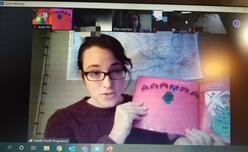The IRC in Seattle helps 2,500 refugee and immigrant community members each year through a wide range of culturally-responsive and trauma-informed services. We continually strive to adapt our services to meet the changing needs of our clients and community. For the past year, that's primarily meant helping families cope with the health, social, educational, and economic impacts of COVID-19. While this year has presented many challenges for our community, it’s also shown us the tremendous power we have when we come together as neighbors to support one another. Read about how the IRC, with help from our partners and supporters, continue to help families meet immediate needs and stay on track toward their post-pandemic goals.
Health
The IRC's Health Empowerment Program provides in-language health education and regular case consultations with refugee and immigrant families, reaching 400+ households at higher risk of COVID-19. The Health Empowerment team is currently working on a vaccination outreach campaign, ensuring people understand the vaccine and are able to access it when eligible. With the help of generous community members, we distributed thousands of volunteer-made cloth facemasks, cleaning supplies, and other health and hygiene items necessary for keeping families healthy and safe.
Digital Skills & Access
Digital equity and inclusion are critical to unlocking opportunities for Washington’s newcomers. Understanding and navigating digital devices and interactions empowers people to continue their education, access services and community resources, pursue employment opportunities, engage with healthcare providers, and participate fully in in their new communities. In response to the increased need for digital access support during the pandemic, IRC launched a new digital equity program. To date, hundreds of new devices have been distributed to families, and both youth and adults have access skill-building opportunities, including in-language, one-on-one tutoring.
Youth

The IRC's Youth Program helps newcomer students and their families navigate new education systems and achieve educational goals. With school buildings closing in March 2020, the Youth Program quickly shifted its focus to remote learning and helping families access and understand the rapidly-changing school environement. Over the course of the past year, IRC has conducted virtual tutoring and learning programs for 450 refugee and immigrant students. Thanks to generous donations from the community, IRC has distributed 430 remote learning kits to newcomer families. More than 50 volunteer tutors continue to virtually work one-on-one with students on homework and English language learning. As school building begin to re-open, the Youth Program team is offering support and information to families as they make choices around returning to the classroom.
Economic Empowerment
Many IRC clients work in industries hit hard by COVID, including hospitality, food service, and the gig economy. Lay-offs, reduced hours, and hiring freezes have created financial instability for many families. Further, some clients experience barriers to accessing benefits pandemic relief due to language barriers, digital access issues, or due to residency or other eligibility requirements. The IRC's Economic Empowerment Program helps people access unemployment insurance, stimulus checks, emergency loans, and other forms of financial relief. The program also continues to help job seekers find new employment opportunities and navigate workplace safety & health measures. In the last year, the IRC has also directly distributed $90,000 in emergency funds to families for rent, utility bills, and other basic needs. Relatively small emergency grants can have huge impacts on people’s lives by helping families maintain housing, have enough food to eat, and ultimately remain on track to achieving their goals post-pandemic. For IRC clients exposed to COVID-19, emergency financial assistance also helps them afford grocery deliveries, transportation to testing sites or clinics, and helps make up for lost wages while quarantining.
Food Security
Food insecurity rose in the past year, particularly among communities in South King County, as people experienced financial instability and challenges accessing groceries due to health concerns. The IRC's New Roots program has coordinated delivery of nearly 10,000 pounds of food directly to families' homes, including fresh produce and culturally-specific staples. New Roots' education around nutrition and food continues in an online space. Physical distancing protocols were implemented at IRC community gardens, ensuring gardeners could continue accessing the space in accordance with public health guidelines and growing healthy foods for their families and neighbors.
Immigration
The IRC's Immigration Program quickly adapted to ensure its essential services could be safely offered remotely. Over the past year, the Immigration Program helped 280 people become U.S. citizens, 220 become legal permanent residents, and helped many more through the process of reuniting with family or navigating other immigration procedures. The team has hosted virtual citizenship workshops, with the support of community partners and a team of incredible interns. Citizenship classes, which help participants prepare for the naturalization exam and learn about their rights as citizens, has moved to a virtual classroom. Three days per week, these classes help people learn about U.S. history, government and legislative structures, and civic engagement.
Take Action
While we look toward the future where vaccines are available to all, the cascading impacts of the COVID-19 pandemic continue. Community support has been vital in providing direct financial assistance and responsive, client-centered services over the past year.
- Make a contribution to our Emergency Fund
- Hold a donation drive and contribute in-kind goods
- Join us for a remote volunteer info session to learn more about our work